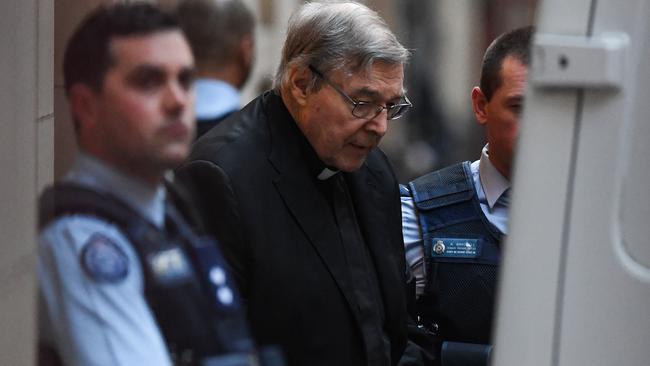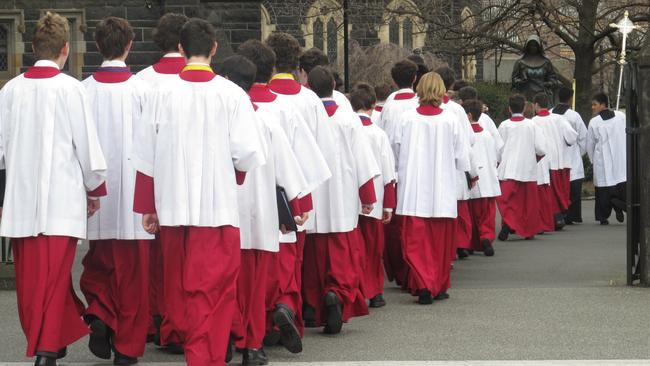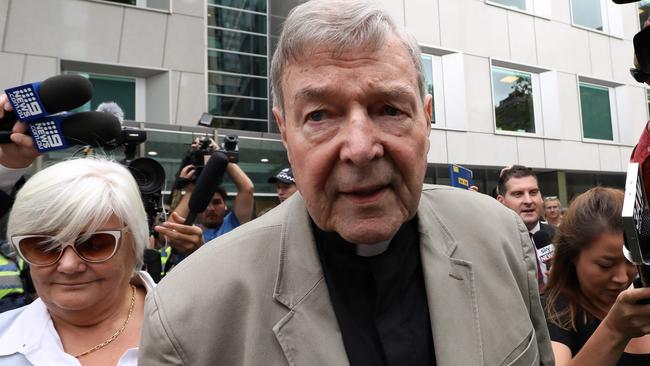Is this really what beyond reasonable doubt looks like?
In a case like that of Cardinal George Pell, where both sides wanted a particular outcome far more than a fair and honest process, justice was never going to be truly served, writes Peta Credlin.
Rendezview
Don't miss out on the headlines from Rendezview. Followed categories will be added to My News.
Last week, it wasn’t just George Pell in the dock but our system of criminal justice as well.
To its great shame, for many years, the Catholic Church covered up for criminals and put its reputation above the rights of the victim.
Other institutions were also culpable, and in exposing the reach of child abuse in our community through the recent Royal Commission into Institutional Child Sexual Abuse, for everyday Australians who want to trust in the good of people, much of our innocence was lost.
There’s no doubt that the sex abuse of minors by people in authority is a monstrous abuse of trust that ruins lives.
But taking sex abuse claims seriously and thinking always of the victims doesn’t mean that every complaint is true, or that there should be a different standard of proof when someone is accusing a Catholic priest of a sexual crime.
RELATED: Court dismisses George Pell appeal over child sex abuse
To convict someone of a criminal offence requires that the court find the accused guilty beyond reasonable doubt. In this case, despite Pell steadfastly maintaining his innocence, he’s been found guilty of an offence that took place more than two decades ago based on the uncorroborated testimony of a single witness when others familiar with the circumstances testified that the offence simply could not have taken place.
I accept how easy it is now after the Royal Commission to automatically convict the priest in our minds but the lawyer in me is sceptical, indeed has grave doubts, when the usual robust processes of our justice system go awry.

It’s hard not to be troubled by this conviction given that the initial police investigation was launched before any complaint had been made; one jury was unable to make up its mind, while another jury took several days to reach a verdict; and two judges said that it was “open” to the jury to find the offences proven, yet another judge said that it was not.
So let’s be clear: if one jury was right, the other must have been wrong. Either two senior judges are wrong, or one is. It’s hardly a strong basis for destroying the reputation and ruining the life of Australia’s most senior churchman.
Put simply, based on the years of history around this trial, and the earlier one, and now this appeal, what if it was you in the dock, or your brother, or your son?
RELATED: Explainer: George Pell guilty of child sex charges
To those who regard Pell as an authoritarian throwback — and a climate-denier as well — the majority judgment dismissing his appeal would no doubt have been deeply satisfying. Likewise, all those convinced that the Catholic Church has been little better than a giant paedophile ring will be relieved that one of the world’s most senior Catholics remains behind bars.
If every victim is to be believed, no matter how many years later the claims emerge and however implausible they might be, of course Pell is guilty, as is every accused sex offender.

The paradox here is that Pell was the first major bishop in this country — and one of the very first anywhere — to recognise that the Church had a serious problem; and to insist that priests who betrayed their vows had to be expelled from the ministry, and reported to police.
But even within the Church, Pell was always a polarising figure. In part, it was his forthright insistence on orthodox teaching: in support of celibacy; against women priests; and on the primacy of the spiritual over the worldly. In part, it was his dominating presence. Not since Archbishop Mannix, more than half a century ago, has there been a Catholic priest in this country who so commanded attention. And, in part, it was his rejection of political correctness, more generally, as well as just within the Church.
RELATED: Pell could be moved to a medium security prison next week
If Pell is guilty, he deserves to be in jail. But even the majority judges handling this appeal, while finding the complainant “someone who was telling the truth,” conceded that there were “powerful arguments” that the attack on the choir boys was improbable or implausible. By contrast, the dissenting judge, Justice Mark Weinberg, found that there was “a significant body of cogent evidence casting serious doubt on the complainant’s account”.
He said that the complainant “seemed almost to ‘clutch at straws’ in an attempt to minimise or overcome the obvious inconsistencies between what he had said on previous occasions and what the objective evidence clearly showed”. Hence, while being “troubled” that he differed from his colleagues, he’d “reflected even more carefully upon the proper outcome” and could not “in good conscience do other than to maintain his dissent”.

And just like in politics where there’s a big variation in the quality of ministers, the bench too has some appointments that are better than others. No one can dispute Weinberg’s credentials to hear this appeal as a former Director of Public Prosecutions, and of all judges in the appeal, the most experienced in criminal law.
RELATED: George Pell’s lawyers look set to fight for his freedom
In a case like this, the problem is that too many people had already made up their minds about what constituted justice. Both sides wanted a particular outcome more than a fair process. To those who wanted an acquittal, Pell remains a modern-day martyr, convicted of being a conservative Catholic and of being the leader of a Church that didn’t always do enough to stamp out child abuse. To them, he’s suffering for the crimes of others.
To just as many, perhaps more, Pell is guilty and even if he isn’t, all that matters is the punishment of paedophiles; to them, even if some innocent priests are caught up along the way, if they didn’t do it, they were at least part of a culture that let these crimes happen, and then covered them up, so that’s justice of sorts anyway.
Only it is not.
If appealed, this saga may have still more to run; but, whatever the further legal process, it will be a long time before we see a more contentious judgment.
Originally published as Is this really what beyond reasonable doubt looks like?



